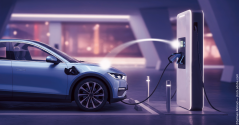CODICO Supports New EU Regulation for Charging Stations

Standard for Newly Installed and Refurbished Charging Stations
Starting January 1st, 2027, ISO 15118-20:2022 must be implemented for newly installed and refurbished charging stations. This standard regulates communication between electric vehicles (EVs) and charging stations (EVSEs) to ensure improved interoperability, charging safety, and V2G. CODICO is well-prepared to meet this challenge.
New EU Regulations on EV Charging Infrastructure
The regulations (EU) 2023/1804 and 2025/656 of the European Parliament and of the Council focuses on publicly accessible and private charging stations for alternating current and direct current (AC and DC), focusing on light and heavy-duty vehicles, Class L electric vehicles, and electric buses. The European Union is actively working on regulations to support and promote bidirectional charging, also known as V2G (vehicle-to-grid), as part of its broader strategy to integrate electric vehicles (EVs) into the energy system.
No Retrofit Required for Existing Charging Points
First of all: Existing charging infrastructure does not need to be retrofitted. Existing publicly accessible charging points for charging modes 3 and 4 with low-level communication solutions such as PWM, which are already capable of communicating with electric vehicles currently on the market and equipped with EN ISO 15118-2:2016, will be exempt from the implementation of Parts 1 to 5 of EN ISO 15118 or subsequent extended versions such as EN ISO 15118-20:2022. The term »refurbished« should be understood as a major or complete replacement of relevant charging point equipment. Regular maintenance updates, including the replacement of specific components such as charging cables, should not be considered as refurbished.
Multiple Communication Standards
However, where technically feasible, charging point operators should update existing charging points already on the market to support EN ISO 15118-20:2022 in addition to EN ISO 15118-2:2016 and other potentially existing low-level communication solutions such as pulse width modulation (PWM) according to EN IEC 61851-1:2019. This means the simultaneous presence of ISO 2:2016 and ISO-20:2022. DC chargers are already equipped with up to three software stacks: DIN 70121, ISO 15118-2, and ISO 15118-20. The charging station must offer these standards to the connected vehicle, as the vehicles may only support one of these specifications, and charging interruptions and subsequent switching between standards must be avoided.
Plug-and-Charge
A word about Plug-and-Charge (PnC): Operators of publicly accessible charging points can voluntarily decide whether to offer PnC services, in accordance with the options specified in the EN ISO 15118-2:2016 and EN ISO 15118-20:2022 standards. PnC services are a technological solution enabled by the EN ISO 15118-2:2016 and EN ISO 15118-20:2022 standards. They provide automatic authentication and authorization between the electric vehicle and the charging station. This enables charging based on a contract between the end user and the mobility service provider, including billing information. To complete a charging session, drivers of electric vehicles simply connect the charging point connector to the vehicle, which automatically starts the process. The EU-wide implementation of PnC services and the possibility for end users to have interoperable access to these services across the EU are intended to further simplify EV charging and improve the overall user experience.

CODICO’s PLC Solutions for ISO 15118 Compliance
CODICO is ideally equipped to support the necessary design requirements with its portfolio of Powerline Communication (PLC) solutions based on ISO 15118-3:2016. Suitable for this purpose are both the proven RED-BEET 2.0 module from 8DEVICES as a hardware PLC modem and the DROPBEATS DB2605 System on Module (SOM) with integrated software stack. Support for chipdown designs is also available for projects of a certain size. All solutions are based on the latest QCA7006AQ PLC chip from Qualcomm. On the software side, CODICO works with various partners and can therefore offer hardware and software to the customers. The software partners, in turn, support the implementation of already verified ISO 15118 stacks to complete the integration. Corresponding evaluation boards are also available for these solutions.
DROPBEATS DB2605 RED-BEET-E 2.0Enabling V2G and MCS
Amendment 1 of ISO 15118-20 introduces new features such as the AC DER (Distributed Energy Resource) service, the Megawatt Charging System (MCS) service, and an enhanced security concept. This change is crucial for enabling exanded grid interaction, such as vehicle-to-grid (V2G) and vehicle-to-home (V2H) applications, by specifying how electric vehicles can communicate grid codes and contribute to grid stabilization. In addition to the aforementioned EN ISO 15118-20:2022, the standards ISO 15118-1:2019, ISO 15118-2:2016, ISO 15118-3:2016, ISO 15118-4:2019, and ISO 15118-5:2019 will also form the basis for charging stations starting in 2027. ISO 15118-4, for example, describes »network and application protocol conformance tests« based on ISO 15118-2. For the ISO 15118-20 mentioned earlier, the corresponding conformance testing is described in ISO 15118-21. CODICO also offers application solutions for interoperability testing – simulators, sniffers, and conformance testers are available.
Complementary Components for Reliable Charging Design
CODICO also offers a wide range of suitable PLC coupling transformers from ELYTONE for both EV and EVSE applications. These established couplers feature very low insertion loss in the 3-30MHz range, combined with all the required features (AEC-Q200, isolation, etc.) demanded by the markets. For PLC applications, a 25MHz crystal unit from TXC (AM series, size 3225, 25MHz) is available. The crystal is compatible with the Qualcomm QCA7005 and QCA7006 chips, which require a total frequency tolerance of ±25ppm. Currently, TXC is the only one on the market that meets this ±25ppm requirement, including 10 years of aging. In addition, CODICO offers everything needed for a reliable and efficient EV charging connection. The portfolio includes Type 2 charging sockets according to IEC 62196-2 and permanently in-stalled EV charging cables. For secure electrical connections and strain relief, these are custom-equipped with terminal blocks on one end and cable glands on the device side. Direct PCB contacts for reliable power transmission are also supported – perfect for customized cost-down designs. For the interior of the charging station, a wide range of flexible internal wiring and PCB connection solutions is available for various circuit board orientations, including tolerance-compensating board-to-board connectors and SMT jumper cables. Lever clamps ensure smooth, tool-free, and fast cable connections. To keep everything cool, AC and DC fans for effective temperature management in compact enclosures round out the range.
Your Contact Person
All questions regarding vehicle charging can be directed to Christian Nick.

